Planning to visit Dubai on a budget? Good call! Dubai can be done on $50-$100/day with smart choices, a metro card, and a clear plan. In this 2025-2026 updated travel guide, I’ve pulled together current prices, seasonal patterns, and expat-tested tricks so you can save on flights, sleep well in Deira or Bur Dubai, eat great for less in Al Karama or Satwa, and fill your days with free sights and low-cost wins.
Here’s the promise. You’ll get hard numbers and clear tactics: when to go for cheaper hotel rates, how to cut local transport costs with the Nol card and a 1 AED Abra ride across the Creek, where to find cheap eats (and which food courts are worth it), simple swaps that slash ticket spend, and two ready itineraries (3 and 7 days) that balance Old Dubai, beaches, and modern icons without paying premium prices. I’ll also flag money traps like the Palm monorail and stray taxi routes, plus easy wins like 2-for-1 deals (The Entertainer), happy hours, and summer promos.
Guide to Visit Dubai on a Budget
I write this as someone who tracks Dubai with the help of a local expert: riding the Metro, testing hostels and budget hotel chains (Rove, Ibis, Premier Inn, Citymax), timing the Dubai Fountain for the best free view, and walking the souks with a set figure in mind. If you want beaches at sunrise, souks at noon, and skyline views at night, without overspending, you’re in the right place.
Disclosure: Some of the links below are affiliate links. This means that at no extra cost to you, The Travel Bunny will earn a small commission if you click through and make a purchase. Thank you!
Is Dubai Really Expensive? What a Trip to Dubai Actually Costs
The short answer is no, not if you plan it. Dubai travel costs are manageable with smart choices. Below, I break down Dubai trip costs with real daily numbers, then show simple swaps that keep your Dubai travel budget tight without cutting the good stuff.
Realistic Daily Budget to Visit Dubai (per person)
| Traveler type | Lean daily total (AED / USD) | What that looks like |
|---|---|---|
| Backpacker | 250-370 AED (~$70-100) | Hostel bed, Metro/Nol only, cafeterias & street food, free sights. Skip alcohol or once in a happy hour. |
| Mid-range | 550-800 AED (~$150-220) | 2-3 stars hotel or budget chain (Rove/Ibis/Premier Inn), mix of local eateries + a sit-down meal, Metro + occasional taxi, 1 paid attraction every other day. |
| Family (of 4, total) | 650-1,100 AED/day (~$180-300) | Family room/aparthotel in Deira/Bur Dubai, groceries + food courts, beaches/parks/souks, Metro + short taxis. Add 100-300 AED on days with paid attractions. |
According to BudgetYourTrip, visiting Dubai on a budget will cost about $115/day (~ AED 423), while on a mid-budget you’ll pay around $289/day (~ AED 1,060). Those are global averages. With the tactics in this guide, you can run backpacker days as low as ~$70 and keep mid-range days closer to the $150-220.
What Pushes Your Budget Up & Down
- Beds & rooms. Dubai has true budget stock if you sleep in Deira/Bur Dubai and book off-season. Chains like Rove, Ibis, Premier Inn, and Citymax keep rates sensible.
- Food. Local cafeterias and South Asian eateries in Al Karama and Satwa routinely serve filling plates for far less than tourist restaurants. Groceries (Carrefour, Lulu) + food courts are your friend.
- Alcohol is the budget killer. Even after the 30% alcohol tax was dropped in 2023, a standard pint at around €11.60 is common. Happy hours often bring it to €9.75. If you drink daily, your Dubai trip cost jumps fast.
- Transport. Stick to Metro/Tram/Bus with Nol card and add the iconic abra across the Creek for €0.23. Use taxis for short hops only.
The Fine Print You Should Budget For When You Travel to Dubai
- Tourism Dirham (hotel tax). This is a nightly, per-room fee in Dubai that costs €1.60-4.65 depending on hotel category, charged up to 30 nights. It’s on top of the room rate.
- 5% VAT applies to most goods and services, including restaurants and attractions. You’ll see it itemized on receipts.
A Quick Dubai Trip Cost Breakdown (Typical Prices, per Day)
- Accommodation is €16-26 in a Dubai hostel or €46-81 in a 2-3 star hotel in Dubai
- Food costs €7-14 in cafeterias or grocery stores, or €19-35 in a budget place
- Transport using public transit and an occasional taxi is €2.30-9.30
- Activities cost between €0-7 on free days and €12-35 on paid days
- Alcohol is optional, so €0-23+ (happy hour vs regular bar prices).
Use this information to set your Dubai budget per day. If you keep alcohol consumption to an occasional, favor cafeterias, and ride Metro, your Dubai travel budget lands near the low end. If you add daily drinks, paid views, and frequent taxis, you’ll track closer to mid-range, right where BudgetYourTrip’s averages sit.
Is Dubai expensive? It can be. But with the right neighborhoods, transit, and food choices, you can keep spending tight and still see the best of the city.
When to Visit Dubai for Maximum Savings
If you’re hunting for the cheapest time to visit Dubai (or the cheapest month to go to Dubai) and want the best time to visit Dubai on a budget, think in seasons, not dates.
Off-season June-August for Deep Savings, but Serious Heat
This is when flights and hotel rates often drop by as much as ~50%. Daytime highs sit around 40-45°C with heavy humidity, so I recommend you plan outdoor time at sunrise or after dark and build the day around free, air-conditioned stops like big malls, metro-connected galleries, and indoor heritage spaces.
A classic move is a late afternoon in Dubai Mall (free aquarium viewing panel, window-shopping), then the Dubai Fountain and Burj boardwalk after sunset when the heat eases. If you can handle the climate and keep to the Metro, off-season gives you the most value per euro.
Shoulder Months April & October Offer the Best Balance
April and October usually deliver the sweet spot: lower prices than peak, far kinder weather at roughly 28-35°C by day, warm sea, and long evenings outdoors. Book flexible rates, then re-check a week or two later as hotels release last-minute discounts. If you pair a budget chain in Deira/Bur Dubai with the Metro and food courts, these months feel like peak, minus the bill.
Peak Season November-March When You Pay More for Perfect Weather
This is Dubai postcard season. It’s dry, sunny, and comfortable at only 20-28°C by day. It’s also the most expensive window, especially around year-end and major events. If you must come now, lock rooms early, base near a Metro station, and lean hard on free days (beaches, souks, evening fountain shows) to keep spending in check.
Ramadan Brings Real Deals with Few Trade-Offs
Ramadan shifts earlier by about 10-11 days each year. It brings excellent iftar deals (great value buffets), quieter tourist sites by day, and frequent hotel promos. The trade-off is that many people avoid eating or drinking in public during daylight, and some venues adjust hours or tone down entertainment. You should treat Ramadan as a budget-friendly cultural month, so plan lunches discreetly, book an iftar, and enjoy lively nights after sunset.
Neha’s Dubai Local Advice: For the lowest prices, aim for late July-August and build an indoor-first plan. For balance, pick April or October. For perfect weather, accept peak pricing November-March and trim daily costs with Metro, free sights, and cheap eats.
How to Find Cheap Flights to Dubai & Affordable Packages
Finding cheap flights to Dubai is all about building a system you can run the same way every time. Set fare alerts, search in a clean browser, track flexible dates, price DXB alongside other airports, compare Dubai vacation packages, and wait for the best window to book.
Build a Smart Search & Let Prices Come to You
Set fare alerts on Google Flights and one meta search (Skyscanner or Kayak). Track flexible dates with the price calendar, then watch for dips 6-10 weeks out. I usually compare 2-3 nearby departure airports and midweek flights from Tuesday to Thursday included. I search once in a clean profile (private/incognito window or a fresh browser) to avoid cookie-based nudges, then I stop refreshing and wait for the alert.
Widen the Airport Net: Dubai + Abu Dhabi + Sharjah
Add AUH (Abu Dhabi) and SHJ (Sharjah) to every search. From Europe, low-cost carriers often price AUH Abu Dhabi lower. SHJ Sharjah works well from South Asia and MENA.
Factor in the transfer. AUH Dubai buses and shared shuttles are cheap, and even a split taxi can keep the total below a nonstop into DXB. If the fare gap is big, then land on AUH Abu Dhabi, take a bus to Dubai, and pocket the savings.
Expat Budget Tip: Emirates “Dubai Connect” Stopover
If a long layover is built into the best available Emirates itinerary, Dubai Connect can include a free hotel + transfers in Dubai. It’s a quiet budget hack if you can’t get a shorter connection on the same ticket. You book on one ticket, meet the minimum layover window, be on an eligible fare, and check visa eligibility for entering the UAE.
Neha only uses this Dubai budget hack when the schedule naturally qualifies. She doesn’t force a bad routing and just lets the airline’s rules work for her.
Packages That Beat Standalone Tickets
When flight prices spike, price Dubai vacation packages through big OTAs and local tour brands (Expedia/Booking packages, lastminute sites, airline holidays, plus regional operators). Bundles can come in cheaper than flight-only, especially off-season. Run the math against the same hotel booked direct, then decide.
Watch the Fine Print (This Matters in Dubai)
Package pages often hide extras until checkout. In Dubai, you’ll still pay the Tourism Dirham (per room, per night) at the hotel. Airport transfers are not always included. Some resorts add service charges on-site. If a package looks too good, check breakfast, room type, taxes/fees, and cancellation terms before you click to pay.
My Quick Dubai Budget Booking Sequence
- Set alerts (origin ±200 km, DXB/AUH/SHJ, flexible dates).
- Check off-season and shoulder windows first (June-August, then April and October).
- Price AUH vs DXB, including bus/taxi to Dubai. Add SHJ if routes fit.
- Cross-check flight-only vs package (same hotel, same dates).
- See if Dubai Connect applies if flying Emirates with a baked-in long layover.
- Book the cheapest clean option near a Metro stop. Add transfers later if not bundled.
Use this flow and you’ll catch the dips, keep routing sensible, and avoid the fees that quietly bloat so-called cheap tickets and packages.
Where to Stay in Dubai on a Budget
If you’re weighing where to stay in Dubai on a budget, focus on location first, then pick from Dubai cheap hotels, the best budget hotels in Dubai (reliable chains), self-catered apartments, hostels, or Couchsurfing. Neha, our local expert, recommends booking accommodation near a Metro stop to cut taxi spend, then choose Deira or Bur Dubai for value, food options, and easy access to the Creek, souks, and Old Dubai.
Best Neighborhoods with Budget Accommodation in Dubai: Deira & Bur Dubai
For low rates and short rides, these two are the best. Deira and Bur Dubai sit on the Creek, have multiple Metro stations, and pack in cheap eats (cafeterias, South Asian restaurants), markets, and everyday shops. You’ll find simple hotels, hostels, and serviced apartments at prices that move far less than Marina or Downtown. If you want classic sights on foot (souks, abra boats, Al Fahidi), this is the pocket that keeps daily costs down.
Budget Hotel Chains in Dubai
When choosing where to stay in Dubai on a budget, start with the big-value chains because they consistently deliver Dubai cheap hotels without surprises. Rove properties give you compact, well-designed rooms in handy locations close to the metro, so you cut taxi costs and time. Ibis is the steady option if you’re looking for simple and clean accommodation, usually priced on the right side of the curve in Deira or Bur Dubai. Citymax places you in central neighborhoods with fair rates and plenty of cheap eats on the doorstep.
For families, Premier Inn often wins thanks to bigger rooms, comfortable beds, and the bonus of a pool at many sites, which is useful in the heat. And finally, Oyo brings the widest spread of budget listings. Just filter hard by recent reviews and exact addresses to avoid out-of-the-way locations.
For the best budget hotels in Dubai, this chain-first approach keeps costs predictable, puts you near transit, and frees up cash for activities instead of rooms.
Neha’s Dubai Budget Advice: Benchmark all five hotel chains against Deira and Bur Dubai first, since those areas pair low nightly rates with food courts, cafeterias, and souks. If prices spike, I’d widen the search to Al Barsha for better deals than Downtown while keeping metro access to Mall of the Emirates and the Marina.
Self-catered Dubai Apartments
For families and groups visiting Dubai on a budget, self-catered apartments win on space and food savings. Airbnb makes this easy, just search Airbnb Dubai Jumeirah or Airbnb Dubai Deira, then filter by price, metro proximity, and kitchen. You’ll often get a lounge, separate bedrooms, and a washer, which comes in handy on longer stays.
Dubai Budget Accommodation Tip: I avoid using Airbnb because of past experiences. So if you want an Airbnb alternative, run the same filters on Booking.com, Expedia, and Hotels.com. Dubai has a wide supply of serviced apartments that price competitively off-season and let you cook a couple of meals a day.

Dubai Budget Hostels
If you want true Dubai cheap hotels pricing, start with hostels. Dorm beds are commonly listed at €15-25 in low season and €20-35 in shoulder/peak on major platforms. On Hostelworld, for example, Dubai city pages routinely show Dorms from €16-19 across several properties. Private-room hostels often start in the low €20s when demand is soft. Those ranges move with season and events, but they’re reliable anchors for links and price boxes.
Heartland Hostel (Trade Centre / Emirates Towers Metro) is handy if you’re looking for a Downtown location on a backpacker budget. You’re two metro stops from Burj Khalifa/Dubai Mall, so it’s a great choice if you want central access without Marina prices. It comes with a shared kitchen and women-only dorm options.
96 Hostel Dubai by Lunar (JBR / Marina) is an apartment-style hostel on the 18th floor in JBR, only 5 minutes from the beach. It has balcony views, a big shared kitchen, and tram access at Jumeirah Beach Residence 1. This is a great choice if you want beach + social without a hotel bill.
Nowmade Capsule Experience (JBR) has capsule pods near the beach with a tidy common area. It’s a solid choice for solo travelers who want Marina/JBR without a private room. Trams and the Marina walk are on your doorstep, so you can skip taxis.
Backpacker 16 (Barsha Heights / Tecom) offers a practical location between Marina and Downtown with metro access. It’s more hostel-apartment than classic dorm house. It has shared flats within a tower, with a kitchen, washing machine, lockers, towels/hairdryer, ironing board, microwave, and toaster in the apartment, plus free Wi-Fi. Guests also get access to building amenities like a rooftop pool, gym, sauna, and steam room.
Dubai Youth Hostel / UAE Youth Hostels Association (Al Qusais) is an old-school YHA setup with a pool, optional breakfast, and on-site laundry, good for students and first-timers. Stadium metro is a short walk away, and Al Mamzar Beach is your cheap beach day.
At The Top Hostel (Dubai Marina / JBR) is a beachfront, high-rise hostel just a short walk from the Walk and Marina Beach, with shared kitchen access, fast in-room Wi-Fi, laundry, and use of a building outdoor pool. This is a good option for budget travelers who want JBR’s location without hotel prices.
Dubai Accommodation Tip: Depending on your preferences, you can filter by female-only dorms, shared kitchens, and walking time to the nearest metro. Those details save more than shaving €1-2 off the bed price.
Couchsurfing Dubai
Couchsurfing is the ultra-budget lane and a good way to meet people fast. You can also join the Couchsurfing weekly meetup to swap travel tips, find last-minute couches or room shares, and build a local network. Create a profile on Couchsurfing.com, message hosts with clear dates and what you’re doing in the city, and read references before you commit. It’s a solid way to cut accommodation costs and get a local perspective, especially if you’re staying longer than a few nights.
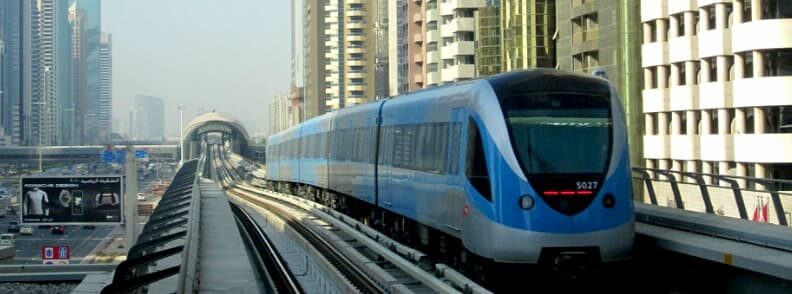
Getting Around Dubai Without Overspending
The cheapest way to travel in Dubai is to think Metro first, then layer in bus/tram, and the classic abra across the Creek. Keep a Nol card in your pocket, and most rides cost between €0.70-1.75. Anything pricier (hello, Palm monorail) gets a hard look before paying.
Dubai Metro + Nol card
Pick up a Nol Silver card at any station for 25 AED (around €5.75). It comes with 19 AED (€4.35) preloaded, so you can ride immediately. Typical fares are 3 AED (€0.70) for 1 zone, 5 AED (€1.15) for 2 zones, and 7.5 AED (€1.75) for 3+ zones. Keep around €1.75 on the card to pass the gates.
Neha’s Money-Saving Tip: Up to three transfers (e.g., Metro → tram → bus) within a short window count as one journey priced by zones, so stringing legs together stays cheap. Also, avoid the Gold Class cabin. It’s a premium fare you don’t need.
Dubai Abra across Dubai Creek for 1 AED in Cash
For the most iconic and cheapest ride in the city, take the motorised traditional abra between Bur Dubai and Deira for €0.23 or 1 AED per person, per trip. You pay cash at the pier, boats run from early morning to late night, and the crossing drops you steps from the Gold and Spice Souks.
Dubai Travel Tip: Take the abra just after sunset. You’ll enjoy cooler air, skyline reflections, and zero transport premium.
Dubai Bus & Tram, Best for JBR/Marina on the Cheap
The Dubai tram links the Marina and JBR to the Red Line, and buses fill the gaps along the coast and out to residential areas. Both charge the same Nol zone fares as Metro, so you stay in the €0.70-1.75 band.
Neha’s Money-saving Tip: Plan a Metro to tram connection instead of hailing a taxi along the beachfront. With a valid tap-out/tap-in, you keep it as one journey on your Nol card.
Dubai Taxis & Ride-shares
Taxis and ride-shares are fine for short hops or late nights, but avoid long hauls, which you can partly do by metro. The classic trap is the Palm monorail, which is NOT on Nol, and a simple one-way can cost 20 AED (€4.60), which is far more than a Metro + short taxi combo to the same spots on the Palm.
If you’re heading to Atlantis or Nakheel Mall, ride the Dubai metro to Palm Jumeirah (Palm Gateway) and only take a taxi for the last leg. That split keeps your transport costs grounded in Nol fares, not tourist rates.
Neha’s Advice for Getting Around Dubai: Load a Nol Silver, ride the metro first, use the €0.23 abra for the Creek, add tram/bus for the Marina and JBR, and reserve taxis for short hops. Most days, you’ll keep transport around €2-5 total without feeling restricted.
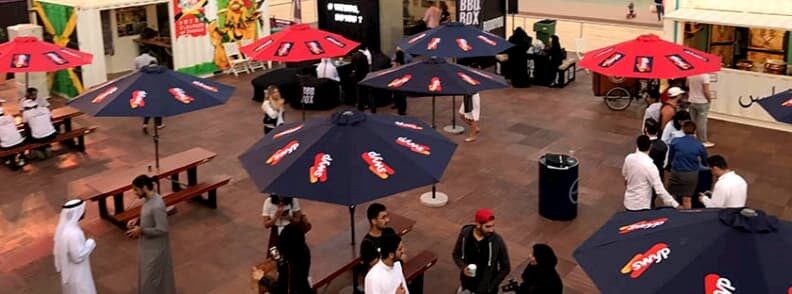
Eating & Drinking on a Budget in Dubai
Dubai’s luxe dining can be pricey, but cheap eats Dubai are real if you anchor meals in Al Karama and Satwa, keep a couple of mall food-court lunches, and use supermarket ready-to-eat for breakfasts or late snacks. Drinks are where budgets slip, so plan them with happy hours or ladies’ nights and you’ll stay on track.
Street-food Neighborhoods Al Karama & Satwa
For affordable restaurants Dubai, I recommend you start with Al Mallah (Satwa) and Foul W Hummus. A shawarma sandwich at Al Mallah sits in the €2-4 price range, with combo plates around €7-10. Two can eat for roughly €14 if you keep it simple. Foul W Hummus runs €12.70 for two, with mezze plates from roughly €6.90. They’re good value if you’re sharing. In Satwa, Pakistani and Indian cafeterias serve full plates in the €3.50-5 range, which is why Neha routes most casual dinners there.
Food Courts for Predictable Value near the Metro
Mall courts are a reliable fallback. Most simple meals land at €6-10.50. You can ride the Red Line into Dubai Mall or another big center, eat in the court for air-con and price control, then head back out without paying a taxi premium.
Carrefour and LuLu for Groceries & Ready-to-eat Meals
If you’ve got a hostel kitchen or a serviced apartment, plug breakfast and one light meal with supermarket grabs. Carrefour bakery packs often price €1.50-4, and LuLu’s ready-meal aisles run frequent promos. These two quick stops can replace one restaurant bill and save a family €10-20/day.
Plan Alcohol in Dubai (Happy Hours, Ladies’ Nights, Duty-free)
Pints in regular bars commonly sit around €11-12. Keep costs down by buying limited duty-free, then timing nights out for happy hours (deals often start at €8 a drink) or ladies’ nights that include complimentary beverages on Tuesdays and other weekdays across the city. Check listings the day before and pick venues near a Metro stop.
Ramadan for Real Value Plays
During Ramadan, you should book iftar buffets while remembering daytime restrictions on public eating. They’re excellent value and a cultural highlight. City guides publish neighborhood roundups every year, including budget picks under typical restaurant prices.
How to save money on food in Dubai: Eat in Karama/Satwa, use mall courts on hot days, stock Carrefour/LuLu for quick meals, and time bar visits to happy hours/ladies’ nights. That mix keeps most lunches and dinners €2-10 without feeling like you’re missing out.
Cheap & Free Things To Do in Dubai
You will not run out of free things to do in Dubai. The city is full of cheap things to do in Dubai, from parks and beaches to small museums and historic quarters. One of the best budget moves is simple: walk. Put on comfortable shoes and spend a day exploring streets, waterfronts, and souqs for the price of a coffee.
If you prefer structure, a Dubai City Pass can bundle major attractions at a discount. It suits travelers who want several ticketed sights in a short window. Always compare the pass inclusions with your actual plan before buying. You can also save by watching for seasonal sales and limited-time promos. Off-season often lowers both attraction prices and hotel rates, which stretches your budget further.
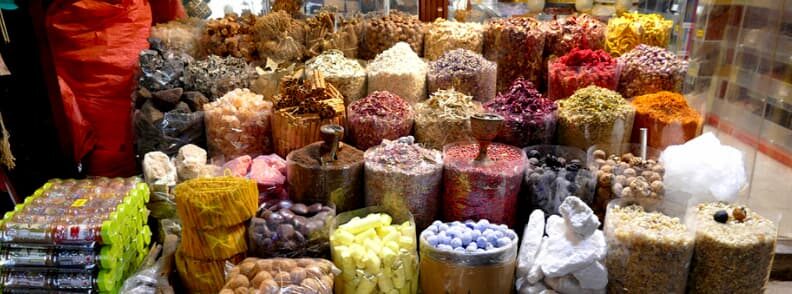
Old Dubai. Al Fahidi, the Creek & the Souqs
Begin in the Al Fahidi Historic District. Entry is free, and the wind-tower lanes, courtyards, and small galleries make an easy half day. Inside the quarter, the Dubai Museum sits in Al Fahidi Fort, which dates to 1787. Exhibits cover traditional Emirati life and the city’s growth into a modern hub, including a typical home, antique musical instruments, and a section on maritime heritage with sailing vessels and pearl-diving gear. Interactive elements add context, including a virtual reality segment that contrasts past and present.
Next, ride an abra across Dubai Creek. The public boat crossing costs about €0.23 each way and remains the cheapest scenic ride in town. On the Bur Dubai side, wander the Textile Souq before or after your crossing. On the Deira side, loop through the Gold Souq and the Spice Souq, soak up the noise and aromas, and bargain only if you plan to buy. Al Fahidi’s restored houses feature striking black coral stonework; take a moment for photos before you move on. The whole Creek loop can be done at almost no cost if you keep it to walking and the abra.
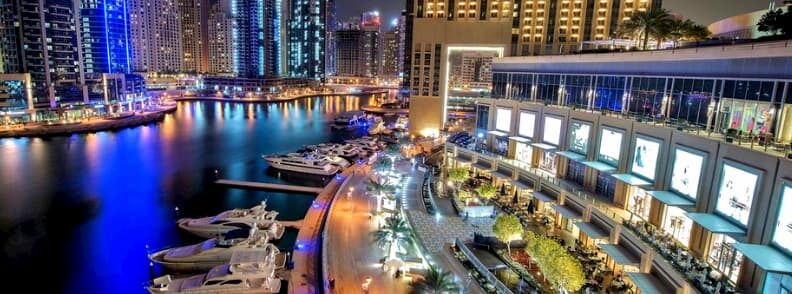
Waterfronts at JBR Beach, Kite Beach, Umm Suqeim, Black Palace
For more free things to do in Dubai, there’s always the waterfront. Bring water, a hat, and plan your swim early morning or near sunset. Promenades are wide and well-lit, so an evening walk costs nothing and still feels special.
Dubai Marina is a lively area to explore on foot or by bike. The harbor path runs for about 8 km, so you can set your own pace while you watch the yachts and the skyline. The architecture changes block by block, which keeps the walk interesting. There are two mosques on either side of the Marina open to the public, a quiet stop that adds culture to an otherwise sporty loop.
The Burj Khalifa Boardwalk is another zero-cost idea. It sits at the base of the tower and circles the lake on a free promenade, so you can photograph the Burj from ground level without paying for an observation deck ticket. In the evening, you can also watch the Dubai Fountain from the promenade. Performances run about every 30 minutes after 6 PM, so it is easy to time your visit after a cheap dinner in a nearby food court.
Finish with the Jumeirah Beach Residence Walk. The shoreline here is clean and busy, with murals, benches, free Wi-Fi, and tidy public restrooms. Families, joggers, and people walking pets share the same strip. You may even see a camel on busy evenings. Cafés and casual dining line the route, so you can window shop, grab a budget snack, or just keep walking and treat it as another of the city’s cheap things to do.
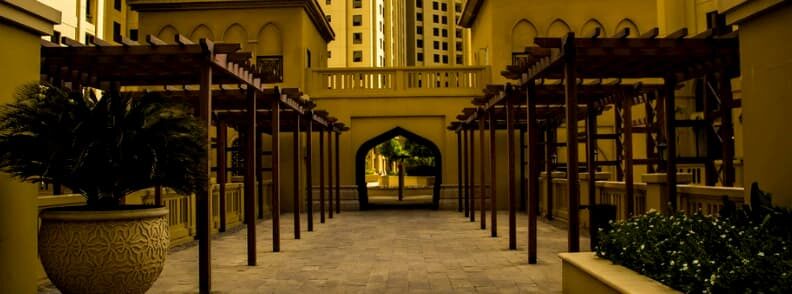
Free Dubai Beaches
Dubai’s coastline is an easy win for free days. Most city beaches have free public access, soft sand, showers, changing cabins, lifeguards in season, and cafés close by, so you can slow the pace without spending. If you want extras like sun loungers or umbrellas, you will find rental desks on the busier stretches, and there are plenty of kiosks for snacks and cold drinks.
Jumeirah Beach sits in the heart of the city and works for simple swims, tanning, and casual water sports. Facilities are plentiful, and you are never far from cafés and restaurants, which makes it a reliable pick for families. Kite Beach in Jumeirah draws kiteboarders and runners to a long, clean promenade. You get showers, shaded seating, gear rentals, and a string of street-food trucks and small cafés for a cheap lunch after the water. Umm Suqeim Beach offers the same easy formula with a calmer vibe, good lifeguard coverage, and quick access to low-key cafés, so it is an easy half day if you are staying along Jumeirah.
If you prefer a quieter patch of sand, Black Palace Beach sits off the main road between Al Sufouh and the Palm. The water is clear, and the skyline views are terrific. It feels more natural than the city’s marquee strands, so bring what you need and plan around shade and water, since on-site services are limited.
For a walk with plenty to see, The Beach at JBR is the social option. The boardwalk has murals, benches, free Wi-Fi, clean public restrooms, and a long list of cafés and casual dining. Beach volleyball, kayaking, and stand-up paddleboarding are available, and the broad promenade makes it just as good for a no-cost evening walk as it is for a swim day.
Dubai Parks: Zabeel, Safa, Creek, Al Mamzar, Al Ittihad (Low Entry Fees)
Dubai’s big parks are the cheapest way to slow down the day. Gates typically charge a token amount, and the value is in shade, lawns, playgrounds, and long paths for walking or cycling.
Dubai Creek Park sits beside the water and works well for picnics and family time. Entry is about €1.15 per person, paid with an Nol card at the gate. Inside, you will find long promenades, gardens, play areas, and separate paid attractions such as the Dubai Dolphinarium, Children’s City, and a cable car with its own ticket. If you want a very low-cost afternoon, skip the add-ons and stick to the lawns and Creek views.
Zabeel Park is central and easy to reach. Expect an entry of about €1.15 and acres of paths and lawns for exercise or a quiet hour under the trees. On select weekends, the Dubai Flea Market sets up at Gate 1 and Gate 2, which turns the park into a budget treasure hunt and keeps the entry fee the same. Instead of focusing on the park’s activities, I suggest you focus on the gardens, sports areas, and seasonal markets.
Safa Park remains a local favorite for picnic space, a lake, and loop paths. The Dubai Water Canal now cuts through one side, which adds views and bridges. Entry is about €0.70 per person. It is a good pick if you are staying near Downtown and want to relax in a green oasis without traveling far.
Al Mamzar Beach Park gives you both lawns and the sea in one stop. Pedestrian entry is about €1.15, and cars pay about €6.90 per vehicle. Inside, you get five sandy beaches, shaded picnic areas, kids’ play zones, and plenty of room to swim or sunbathe. If you are spending a whole day on the coast, this is the most affordable way to add facilities to a beach plan.
Al Ittihad Park on Palm Jumeirah is free at all hours and lined with native plants. A long jogging and walking track runs between the Golden Mile buildings and the monorail. It is perfect for an early run or a shaded stroll without opening your wallet.
Neha’s Dubai Budget Tip: Go light on paid extras, bring water and a hat, and you can spend half a day in any of these parks for roughly the price of a coffee.
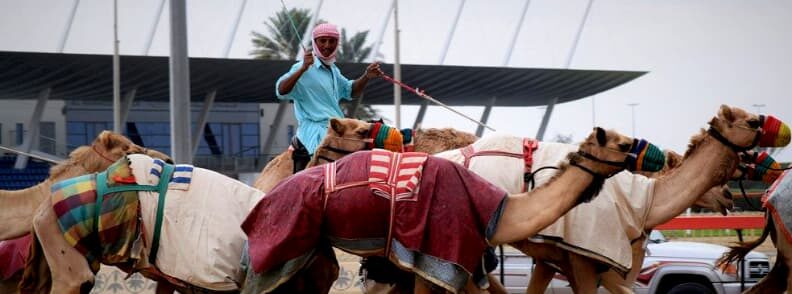
Cultural Windows. Camel Racing, Meydan Horse Racing, Souq Madinat
Camel racing is a classic cultural window and one of the most free things to do in Dubai in winter. The season typically runs from November to March. Many programs list Friday mornings, and you will also see schedules noting Fridays from 6:00 to 8:00 PM at the Dubai Camel Racing Club. Watching is free, so add it to your cheap things to do in Dubai list and plan for cool hours at sunrise or after sunset.
If you enjoy horse racing, Meydan Racecourse is an easy night out. The main season also runs from November to March, with Thursday evenings from 7:00 PM a standard slot. It is a good place to people-watch, see serious horsepower, and then sit down at one of the on-site restaurants or bars if you want to turn it into a full evening. You can keep it budget-friendly by arriving by Metro and short taxi, skipping premium seating, and setting a firm snack and drink budget before you go.
Souq Madinat Jumeirah is free to enter and perfect for a slow walk. It was designed to evoke an old Arabian market, with shaded arcades, canals, courtyards, and plenty of shops and cafés to browse without spending. Children love spotting the large turtles in the fountain pools. The bonus is the view. From several walkways, you get one of the best angles on the sail-shaped Burj Al Arab without paying an observation deck fee.
Low-cost Icons Dubai Frame & Miracle Garden
For a small paid day that still feels budget-friendly, pick one low-cost icon. Dubai Frame tickets are roughly €12 for adults, and the panorama over old and new Dubai delivers strong value for money. Dubai Miracle Garden is seasonal and typically priced around €12 for general entry, which makes it an easy half-day among sculptures built from millions of flowers. If you want to keep spending even lower, pair either stop with a free waterfront walk or a park visit so the overall day still sits in the budget column.
Neha’s Local Insight: Souq Madinat Jumeirah gives you free entry and great photo spots. It is a smarter choice for skyline shots than paying for high-rise observation decks when you are focusing on cheap things to do in Dubai.
Shopping in Dubai Without Blowing Your Budget
If you want cheap shopping Dubai style, aim for souks and local markets first, then work the Dubai outlets. I split my time between bargaining in Old Dubai, stocking up in Karama, and doing a quick sweep of Outlet Village Dubai and Dragon Mart Dubai for brand deals and home basics.
How to Bargain in Dubai Souks
In the Gold, Spice, and Textile Souks, prices are starting points. Open at 30 to 40 percent of the first quote, smile, and be ready to walk away. Many stalls include a tourist premium in the first price, so a calm back-and-forth often lands you near 40 to 50 percent off, especially on textiles and souvenirs. For gold, compare the day’s per-gram board price and focus on the making charge, which is the negotiable part. Cash sometimes gets you a better number, and buying two or three items together helps. If a stall feels pushy, move to the next. There are dozens.
Buy Souvenirs, Fabrics & Abayas for Less in Karama Market
Karama Market is Neha’s fast track for gifts and practical buys. You will find embroidered cushion covers, pashmina-style wraps, modest wear, and tailor-made abayas for a fraction of mall prices. Check stitching, zips, and fabric weight, and ask for the quieter back rooms where the better stock often sits. If you are buying multiple pieces, agree on a single total price rather than haggling over each item. Tailors in the same streets can do simple adjustments by the next day, which is handy for abayas and jilbabs.
Outlet Village Dubai for Branded Outlet Shopping
The Outlet Village Dubai is the cleanest way to get brand names on a budget. You will see posted reductions of 30 to 70 percent and extra red-tag promos inside many stores. Neha goes on weekday mornings for better stock, checks the clearance rail first, and price-matches across two or three shops before paying. Factor transport into your plan and aim to combine it with a Marina or Jebel Ali stop so you are not spending more on the ride than you save at the till.
Get Bulk Value & House Basics at Dragon Mart Dubai
Dragon Mart Dubai is huge and built for bargain hunting. Think luggage, travel adapters, phone cables, small homeware, simple linens, and festival decor. Quality ranges from solid to flimsy, so test zips, plug a cable into your phone before buying, and ask for a receipt. You can bargain here too, especially when you buy two or more of the same item. I set a small list and a hard ceiling so I do not get lost in the aisles.
Time Your Trip for Extra Savings
The annual Dubai Shopping Festival brings genuine bargains and packed malls. If you go, shop on weekday mornings, carry a short list, and use price-comparison apps while you are in the store. Big electronics are best from authorised retailers with a proper UAE warranty. Keep receipts because non-resident visitors can reclaim VAT on eligible purchases at the airport kiosks.
Budget Itineraries to Visit Dubai on a Budget
Here is a Dubai budget itinerary you can copy and tweak. I keep transport via the Dubai metro, plan two free or cheap stops each day, and save one small paid experience for when it really adds value. Daily spend ranges below are per person, excluding flights. A backpacker will spend €35-55, someone on a mid-budget will pay around €90-140, and a family of four can expect to spend €180-260.
3 Days in Dubai on a Budget
Here is a relaxed itinerary for 3 days in Dubai on a budget. You have outdoor stops for cooler hours, trips via Dubai metro with a Nol Silver and the €0.23 abra, and spots to eat like the locals to keep costs low. The plan blends free Dubai icons with one smart paid highlight and leaves space to follow your interests without stretching your wallet.
Day 1. Old Dubai Loop with Abra & Souqs
Start in Al Fahidi Historic District while it is still cool. Walk the wind-tower lanes, drop into a small gallery, then cut to the Creek on foot. Ride the public abra across Dubai Creek for about €0.23 each way.
On the Deira side, follow the alleys through the Textile, Spice, and Gold Souqs. You do not need to buy a thing for this to feel rich. When you get hungry, take the abra back and ride the Dubai metro to Satwa or Al Karama for a late lunch. Cafeterias here serve filling plates for about €4 to €8, and a shawarma costs around €2 to €4.
In the evening, return to Burj Lake for the free Dubai fountain show from the promenade. If you want the closer angle, the floating boardwalk is about €4.60.
Dubai Spending Guide: Backpacker €20 to €35, mid-range €40 to €70, family of four €80 to €140 total. Most of this goes on food plus a small paid add-on if you choose it.
Day 2. Beach Morning & Downtown Dubai without Ticket Fees
Swim early at Kite Beach or JBR. Showers are free, lifeguards are on duty in season, and you can keep valuables light. Pick up a budget coffee and a snack from a promenade kiosk or plan a supermarket breakfast from Carrefour.
After the heat builds, take the Red Line to Dubai Mall. The giant aquarium has a clear viewing panel that you can see for free, which scratches the big-ticket itch without paying for the tunnel. Eat in the food court for about €6 to €10 and spend sunset at the lake for skyline photos.
Dubai Day 2 Spend Guide: Backpacker €15 to €30, mid-range €35 to €60, family of four €70 to €120 total.
Day 3. Budget Desert Safari in Dubai
Keep your morning slow. If your hostel or hotel has a laundry room, this is the time to reset. Book a shared desert safari that includes transfers. Budget deals cost around €20 to €35 per person. Pack water and a small snack so you are not paying premium prices at the camp.
If you would rather keep it free, swap the safari for Zabeel Park at about €1.15 and add Souk Madinat for Burj Al Arab views at zero cost.
Dubai Day 3 Spending Guide: Backpacker €30 to €50 with safari, mid-range €55 to €90, family of four €110 to €180 total.
7 Days Dubai Budget Itinerary
This is the expanded plan I give friends who want a full week without wasting money. It uses everything from the 3-day plan above and adds parks, a museum day, and an Abu Dhabi side trip by bus at about €6 each way.
Day 1. Al Fahidi, Abra & Souqs at an Easy Pace
Walk Al Fahidi, ride the €0.23 abra, wander the Deira markets, then eat in Karama. Keep purchases small on day one. Let your head and wallet settle.
Day 2. Dubai Marina Path & Beach Time
Start at Umm Suqeim or Black Palace Beach for a quiet swim. Move to the Dubai Marina later for an 8 km waterside walk among the towers and moored boats. It is free, photogenic, and good for people-watching. If you see a short taxi line forming, skip it and take the tram back toward the Metro. Dinner near JLT or a mall court keeps you in the €6 to €10 bracket.
Day 3. Dubai Parks & a Single Paid View
Pick Zabeel Park or Creek Park. Entry is about €1.15, and the shade is the real value. If you want one paid view this week, use the Dubai Frame at about €12. Go late afternoon for cooler air and city lights on the way out. If you prefer to keep it free, extend the park picnic and call it a low-spend day.
Day 4. Budget Museum Day & Jumeirah Walk
If you want art and air-conditioning without a ticket, Jameel Arts Centre is free and worth a slow hour. Head to Souk Madinat near sunset. It costs nothing to walk the arcades and canals, and the Burj Al Arab view is one of the best in the city. Eat something small here if you want the scene, or ride to a cheaper bite after photos.
Day 5. Abu Dhabi Day Trip on the Cheap
Buses to Abu Dhabi price around €6 each way. The Sheikh Zayed Grand Mosque is free, breathtaking, and generous to visitors. And there are many other affordable things to do in Abu Dhabi on a budget. Dress modestly and check hours before you go. Pack snacks or plan a simple food court meal to keep the day low. Return to Dubai after sunset.
Day 6. Miracle Garden in Season / Full Beach Day
If your dates fall in season, Dubai Miracle Garden costs around €12 for entry and delivers an easy half day among floral sculptures. If it is off-season, run a full beach day instead. JBR works if you want cafés nearby, Black Palace if you want quiet. Evening option is a happy hour drink near a Metro stop, then an early night.
Day 7. Choose Your Finale
Option one is the budget desert safari at €20 to €35 if you did not take it earlier. Option two is a Creek evening with another €0.23 abra crossing and a street-food dinner for €4 to €8. Option three is a return to your favourite park with a picnic for €1.15 at the gate and a few euros in snacks.
Dubai Weekly Spend Guide
Backpackers will spend €180 to €320, those with an average budget around €350 to €600, and a family of four €700 to €1,050 total (excluding flights and accommodation). These ranges assume Metro and tram as your default, cafés in Karama and Satwa for most meals, two modest paid entries such as Dubai Frame and Miracle Garden, and one deal-priced activity such as a desert safari. If you add alcohol every night, your total climbs fast. Keep drinks to happy hours or buy a small duty-free stash, and you will stay in range.
How to keep the plan smooth: Book a room near a Red Line station, buy a Nol Silver on arrival, carry a small day bag with a refillable bottle, and plan one cold-air stop every afternoon. That rhythm makes a 7 days Dubai budget itinerary feel calm, not cheap.
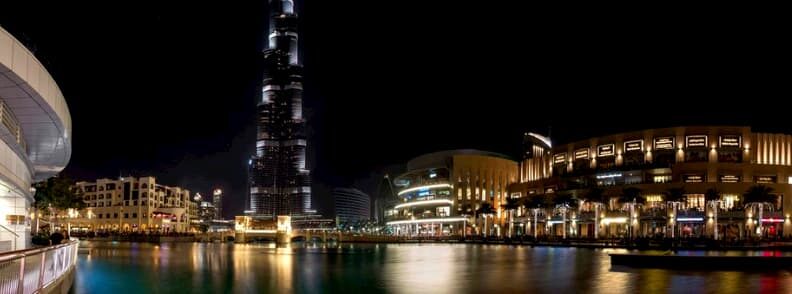
Tools & Tips to Save Money in Dubai
I treat savings in Dubai like a toolkit. Load the right apps, plan a few paid sights on the same day, and let 2-for-1 Dubai deals carry the food bill. Travelers and expats use the same playbook. The difference is consistency. Open the apps before you arrive, flag nearby offers, and build your days around the best value.
The Entertainer Dubai for Easy 2-for-1 on Meals & Attractions
Entertainer Dubai is the everyday win for couples, friends, and families. Most offers are buy-one-get-one on main courses or experiences. Filter by area, save five or six venues near Metro stops, and check the fine print for blackout dates or spend thresholds. The best tactic is to plan lunches with the Entertainer and keep dinners flexible. It removes the guesswork and keeps your average meal price low without eating at the same food court every day. Expats lean on it all year, which tells you how reliable it is.
Dubai Pass / Go City Only If You Will Visit 3-4 Paid Attractions in Dubai
Dubai Pass and Go City can work if you hit several ticketed sights within a short window. I suggest you map one cluster day around Downtown Dubai and another around the Dubai Marina or Jebel Ali, so you’re not wasting time in transit. Then, add one flexible day for anything you missed. If your plan has only one or two paid sights, skip the pass and go à la carte. Always compare the pass list with your actual shortlist so you do not pay for attractions you will not visit.
Groupon UAE for Safari Deals, Brunches & Spa Days
Groupon Dubai is strong for a budget desert safari, casual brunches, afternoon teas, boat rides, and spa offers. Read recent reviews, confirm meeting points and transfer details, and message the merchant to lock a time before paying. For safaris, pick shared transfers, carry water, and avoid add-on upsells at the camp. For brunches, target venues on the Red Line so transport stays cheap.
More 2-for-1 Dubai Deals & Local Perks
Ladies’ Nights cut drink costs on set weekdays. Happy hours often run early in the evening. Also check bank cards and telecom perks for extra 2-for-1 vouchers on dining and attractions. If a hotel hands you a booklet at check-in, flip through it. Those small resident-style coupons often apply to visitors, too.
Stack the Savings Without Extra Effort
Keep a simple flow. Anchor food with the Entertainer, then decide if a City Pass Dubai makes sense for your time in Dubai. After that, add one Groupon activity and time it around your Dubai metro route. Recheck offers the night before in case a better deal pops up. That is it. No spreadsheet, no stress. It’s all about using a repeatable system that keeps the budget in line while you see the city.
Practical Tips to Avoid Extra Costs
Smart Dubai travel tips are mostly small habits. Pack light, respect local rules, and keep transport simple. These Dubai budget hacks stop the drip of surprise spending before it starts.
Pack Right So You Do Not Shop on Arrival
Bring modest, breathable clothing that covers shoulders and knees. You will be comfortable everywhere, and you will not need last-minute outfits for mosques or conservative venues. Add a hat, high SPF, and a light scarf. Carry a refillable bottle. Dubai’s tap water is treated and potable at the source, though taste can vary by building, so use refill stations or your accommodation’s filtered tap if you prefer.
Know the Rules that Trigger Fines
Do not eat, drink, or chew gum on the Dubai metro or tram. Keep your feet off the seats. Queue behind the line on platforms and offer the priority area to those who need it. These are small courtesies (most are just common sense) that also protect your wallet. If you are unsure, watch what locals do and copy that rhythm.
Skip the Common Money Traps in Dubai
At desert camps, you will see keffiyeh and desert scarves pitched at premium prices. Bring your own or buy one earlier in Karama Market for a fraction of the cost.
Outside big malls and hotels, ignore unofficial touts and use Hala in the Careem app to hail an RTA taxi at metered rates.
On the Dubai Palm, avoid riding the monorail end to end for scenery. It is pricey for what you get. Take the Dubai metro to Palm Jumeirah station and a short taxi for the last leg instead.
Keep Small Running Costs Under Control
Top up your Nol card the night before so you do not miss a train and grab an impulse taxi.
Eat where menus show prices clearly. If a restaurant does not display VAT or service on the board, ask before you sit. For alcohol, plan around happy hours or ladies’ nights and keep regular bar visits rare.
Travel Insurance and Healthcare in Dubai
Medical care in Dubai is excellent and expensive. Without travel medical insurance, you pay everything out of pocket, from a quick clinic visit to specialist care. That is the fastest way to blow a carefully planned budget.
Buy cover before you fly and keep the policy number in your phone and on paper. If you prefer plug-and-play options, SafetyWing Nomad Insurance is an easy starting point for short or long trips. Whatever provider you choose, confirm emergency limits, pre-existing exclusions, and the process for cashless clinic visits.
Neha’s Local Dubai Advice: Many first-timers are caught by fines on trains. The simple rule is this: do not chew gum and do not eat or drink on the Dubai metro. Follow that, ride the Red Line, and your daily spend stays tight without feeling restricted.
Visit Dubai FAQs
Planning visiting Dubai on a budget and want fast, reliable answers? This section gives you clear Dubai travel tips on Dubai travel cost, the cheapest time to visit Dubai, cheap things to do in Dubai, the cheapest way to get around with a Nol card and Metro, real meal prices, visa costs, and what hotels and public transport actually cost, so you can make smart choices before you book.
How much money do I need for 7 days in Dubai?
If you keep transport on the Metro and tram, eat in Karama or Satwa, and pick a hostel or a budget chain near a station, a week comes out far lower than most people expect. A backpacker who cooks a few meals and uses happy hours for the odd drink will spend roughly €180 to €320 for seven days, not including flights. A mid-range traveler in a Rove, Ibis, Premier Inn, Citymax, or Oyo, with one or two paid sights and a sit-down meal each day, usually lands around €350 to €600. Families who share an aparthotel and lean on supermarkets and food courts can keep a family-of-four total near €700 to €1,050. Alcohol and taxis are what push you over those bands, so plan them, do not drift into them.
Is Dubai expensive for tourists?
It is only expensive if you default to pay-per-view attractions, daily taxis, and bar tabs. Public transport is cheap, predictable, and air-conditioned, so most rides cost about €0.70 to €1.75 and many days you will spend only €2 to €5 to move around the whole city. Beaches, the Marina and JBR promenades, Souk Madinat views of Burj Al Arab, Ras Al Khor flamingo hides, and Al Fahidi’s lanes are free, which lets you build long days without tickets. Meals in local cafeterias sit around €3.50 to €5, mall food courts hover near €6 to €10, and a shawarma is usually €2 to €4. If you keep alcohol to happy hours or a small duty-free stash, Dubai stops feeling pricey very quickly.
What are free things to do in Dubai?
You can fill days without spending a cent. Walk Al Fahidi Historic District early, take photos along the Dubai Marina and JBR boardwalks in the evening, and time Souk Madinat for sunset views of the Burj Al Arab. Public beaches such as Kite Beach, Umm Suqeim, Jumeirah and Black Palace are free and have showers and lifeguards in season. The flamingo hides at Ras Al Khor and the galleries at Jameel Arts Centre cost nothing, and when the Dubai Fountain shows run, the promenade view is free as well. I mix two or three of these in a day, add a €0.23 abra crossing for atmosphere, and I have a full schedule for the price of a snack.
When is the cheapest time to visit Dubai?
For the lowest flight and hotel prices, travel in June, July, or August when heat is high and room rates drop. I treat these months as indoor-first, with cool mornings outdoors and the middle of the day in malls, museums, or shaded parks. April and October are the sweet spot that balance cost and weather, which is why I book them first if my calendar allows. From November to March you get the best temperatures, and the highest prices, so you need to book early and build your days around free beaches and promenades to keep the budget steady. Ramadan floats earlier each year and brings very good iftar deals in the evenings, along with quieter days and some restrictions on public eating, which suits a budget plan if you adjust your rhythm.
Can you visit Dubai on $100 a day?
Yes, and without feeling restricted. Think of $100 as roughly €90 to €95. Sleep in a hostel or a budget chain in Deira or Bur Dubai, ride with a Nol Silver, and use the €0.23 abra for the Creek instead of long taxi rides. Eat in cafeterias in Karama or Satwa, where a meal sits around €3.50 to €5, and use food courts for the odd €6 to €10 meal when you need air-conditioning. Keep paid sights to one or two highlights such as Dubai Frame or Miracle Garden, plan alcohol for happy hours, and your daily total will stay inside that target without effort.
How much does a meal cost in Dubai?
A simple cafeteria plate in Satwa or Karama comes in around €3.50 to €5, and it will fill you up. In mall food courts, a curry combo, shawarma plate, or rice bowl usually sits near €6 to €10 and the prices are posted, which keeps things predictable. Casual restaurants away from hotels tend to range from €8 to €15 for a main. If you have a kitchen, a quick supermarket run at Carrefour or LuLu lets you cover breakfast and one light meal for a few euro, which drops your daily food spend by a surprising amount. Drinks in regular bars hover near €11 to €12 for a pint, so I plan nights out around happy hours or ladies’ nights.
What is the cheapest way to visit Dubai?
Use the Metro and tram with a Nol Silver card, then add buses and the abra. A Nol Silver costs €5.75 to buy and comes with credit so you can ride immediately, and typical fares are about €0.70 for one zone, €1.15 for two, and €1.75 for three or more when you tap in and out. If you transfer between Metro, tram, and bus within the time limit it counts as one journey priced by zones, which keeps longer trips cheap. The public abra across Dubai Creek adds the city’s best €0.23 experience. I save taxis for the last kilometre at night and I avoid the Palm monorail, since a simple Metro plus short taxi usually beats its fare.
How much does Dubai visa cost?
Entry rules depend on your passport, length of stay, and recent policy updates. Many travelers from Europe, the United Kingdom, the United States, Canada, Australia, and New Zealand receive a free visa on arrival that covers a 30 to 90 day stay, which is the simplest path. Others apply online for an e-visa before travel through the UAE’s official portals, where the fee depends on visa type and duration. I always tell readers to check the UAE government site a few weeks before they book, then print or save the confirmation to their phone so airport checks are quick. If you are combining Dubai with Abu Dhabi on the same trip, verify that the same entry covers both, which it usually does for tourist visits.
Are Dubai hotels expensive?
They can be if you stay in Downtown or the Marina at peak times, but a budget plan does not require that location. In Deira and Bur Dubai, clean budget chains such as Rove, Ibis, Premier Inn, Citymax, and Oyo often sit in the €45 to €80 range for a standard room, and hostels commonly list dorm beds from €10 to €25 in low season. Serviced apartments in the same areas bring kitchens and laundry, which cut food and incidental costs for families and longer stays. I book walking distance to a Red Line station, since that one choice trims taxi spend for the whole week.
Is public transport cheap in Dubai?
Yes, reliably so. The network is modern, air-conditioned, and priced by zones, which means most rides are in the €0.70 to €1.75 bracket and a normal day of moving around the city lands between €2 and €5. Stations are signed in English and Arabic, platforms are safe and clean, and trains run frequently. If you keep a small balance on your Nol card and top up the night before, you will almost never need a taxi, which is the single easiest way to keep a Dubai budget on track.
A complete guide to affordable travel in Dubai to maximize your budget
You now have a clear plan for Dubai on a budget that actually works in real life. Use the Dubai Metro with a Nol card, keep meals simple in Karama or Satwa, stack Entertainer Dubai, Go City/Dubai Pass, and Groupon Dubai when it makes sense, and lean on free icons and cheap things to do while saving paid sights for the days that count. Bookmark this guide before you travel to Dubai, share it with a friend or fellow expat, and check back for seasonal updates so your costs stay sharp. If you need more detail, jump to the itineraries and FAQs above, then tailor the plan to your dates and comfort level. See you out there.
About the Authors

I’m Mirela Letailleur, the creator of The Travel Bunny, and I help travelers and expats plan Dubai on a budget with clear, real-world advice. I keep tabs on Dubai Metro and Nol card fares, flag hotel taxes in euros, and curate cheap eats Dubai spots in Karama and Satwa alongside free beaches, souks, and the €0.23 abra. I also road-test money savers like The Entertainer Dubai, Go City/Dubai Pass, and Groupon so you can visit Dubai and travel to Dubai with a simple plan, honest prices, and no wasted spend.

I’m Neha Ali, your Dubai local travel expert, an experienced trekker, explorer, and foodie who loves turning small moments into lasting memories. I help travelers and expats experience Dubai on a budget with culture-first tips you can trust: ride the abra across Dubai Creek, wander Old Dubai’s souks, use the Dubai Metro with a Nol card, and find cheap eats Dubai in Karama and Satwa before sunset at JBR or Kite Beach. I believe we get one life, so I seek out simple joys, new tastes, and everyday adventures, then share clear routes, neighborhood picks, and practical advice so you can visit Dubai and travel to Dubai with confidence and zero fuss.
You too can submit a free guest post and become a contributor on The Travel Bunny.
Before you travel in Dubai on a budget, you should also read
5 painless ways to budget for your dream vacation
6 ways to save money on your next budget solo trip
3 tips to avoid paying commissions when you travel

